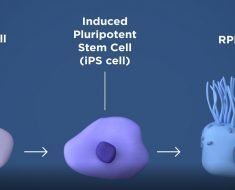Rett syndrome is a rare neurological disorder that affects the grey matter in the brain and leads to physical and mental disability in childhood. The condition is almost exclusively seen in females (one in 10,000–12,000 girls) and only occasionally affects boys.
Symptoms
Some of the symptoms of Rett syndrome are described below.
Early or stage one symptoms (first 6 to 18 months of life)
- General developmental delay
- Difficulty feeding
- Lack of interest in toys
- Repeated clapping or wringing motion of the hands
- Poor coordination
Stage two symptoms (one to four years)
- Repetitive uncontrolled hand movements
- Unexplained irritability and screaming
- Lack of eye contact and disinterest in people
- Increased or slowed breathing rate
- Sleep problems
- Small head size
- Difficulty chewing and swallowing
- Abdominal pain and constipation
Stage three symptoms (two to ten years)
- Floppy limbs (hypotonia) and difficulty walking
- Difficulty using hands to manipulate objects
- Repetitive hand movements
- Teeth grinding
- Abnormal tongue movements
- Arrhythmia
- Epilepsy
Stage four (can last for years and sometimes decades)
- Spine bending to one side (scoliosis)
- Stiffness or spasticity, particularly in the legs
- Inability to walk
Causes of Rett syndrome
The underlying cause of Rett syndrome is a mutation in the gene MECP2. This gene is found on the X chromosome, which is why the condition mainly affects girls. The MECP2 gene codes for the MeCP2 protein, which is required for brain development. If this protein is abnormal, the brain fails to develop properly. Rarely, cases of Rett syndrome are seen in males when a child is born with more than one X chromosome (XXY configuration), a condition referred to as Klinefelter's syndrome.
Diagnosis and treatment
A diagnosis of Rett syndrome is usually based on the child’s symptoms as they develop. Genetic analysis and karyotyping may also be used to detect the mutation that causes this condition.
There is no cure for Rett syndrome and because symptoms can be difficult to manage, children may require help from a variety of professionals. Treatment approaches range from anti-epileptic medications to control seizures, through to physiotherapy, occupational therapy, and hydrotherapy, through to implantation of a pacemaker and the use of beta-blockers to control heart rhythm.
Sources
- http://www.cddh.monash.org/assets/fs-rett-synd.pdf
- http://jmg.bmj.com/content/42/1/1.full
- http://ws.lynchburg.edu/documents/GraduateStudies/
- http://psyc.jmu.edu/school/documents/RettsDisorder.pdf
- http://istituti.unicatt.it/genetica_medica_VanEsch_Rett_syndrome.pdf
- http://www.nhs.uk/conditions/rett-syndrome/Pages/Introduction.aspx
Further Reading
- All Rett Syndrome Content
- Causes of Rett Syndrome
- Rett Syndrome Mortality
- Rett Syndrome Symptoms
- Rett Syndrome Treatment
Last Updated: Feb 27, 2019

Written by
Dr. Ananya Mandal
Dr. Ananya Mandal is a doctor by profession, lecturer by vocation and a medical writer by passion. She specialized in Clinical Pharmacology after her bachelor's (MBBS). For her, health communication is not just writing complicated reviews for professionals but making medical knowledge understandable and available to the general public as well.
Source: Read Full Article





